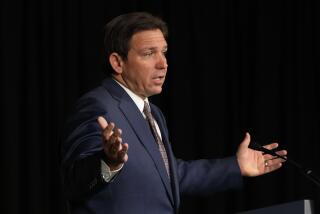Judge Taken Off Key Suit on Smoking : Law: Appeals court also overturns a ruling to open confidential tobacco industry documents.
- Share via
PHILADELPHIA — A federal judge whose fairness to the tobacco industry was questioned in a lawsuit involving the dangers of smoking has been removed from the case by an appeals court.
In a unanimous opinion, the U.S. 3rd Circuit Court of Appeals also threw out a February ruling by Judge H. Lee Sarokin in which he said confidential tobacco industry documents showed cigarette makers lied about smoking dangers.
The tobacco industry had appealed the ruling, saying Sarokin was so prejudiced against it that a fair trial was impossible. The industry lawyers cited statements from his widely publicized opinion.
The appeals court said it did not agree that Sarokin was incapable of an unbiased ruling. However, “we conclude that the appearance of impartiality will be served only if an assignment to another judge is made,” said the opinion issued on Friday.
The case concerned a lawsuit filed by the daughter of Peter Rossi, who died of lung cancer in 1982.
Susan Haines of Philadelphia sued R.J. Reynolds Tobacco Co., Philip Morris Inc., Lorillard Inc., Liggett Group Inc., and the Tobacco Institute, an industry trade association. She charged fraud, claiming the companies knowingly concealed the hazards of smoking while actively misleading the public about them.
The primary vehicle for the fraud, Haines charged, was the Council on Tobacco Research. Tobacco companies advertised the council as an independent research body that would investigate the supposed hazards of tobacco and report those findings to the public.
A jury could conclude that the council’s proposed independent research and promise of disclosure “was nothing but a public relations ploy--a fraud,” Sarokin wrote in his ruling.
Sarokin ordered the council to give Haines access to confidential documents that she believed would prove her case.
In their appeal, the defendants argued that the documents were protected under attorney-client privilege. Sarokin had said the documents should be made available under a crime-fraud exception because he believed that the attorneys were assisting the companies in a cover-up.
The appeals court said although Sarokin’s reasonings may have been correct, he went about them the wrong way, basing his opinion on evidence that had not been presented to the court. And he should have given the companies a chance to argue against revealing the documents, the appeals judges said.
R.J. Reynolds issued a statement Tuesday saying the appeals court decision was what “we hoped for and expected.”
Richard Daynard, chairman of the Tobacco Products Liability Projects, which encourages health lawsuits against tobacco companies, said: “Judge Sarokin had been a very articulate judicial critic of the tobacco industry. This decision silences him.”
There was no telephone listing for Haines in Philadelphia.
Sarokin was also the judge in another highly publicized tobacco litigation case--Cipollone vs. Liggett, the first case in which damages were awarded to an estate of a smoker who died of cancer.
More to Read
Inside the business of entertainment
The Wide Shot brings you news, analysis and insights on everything from streaming wars to production — and what it all means for the future.
You may occasionally receive promotional content from the Los Angeles Times.










